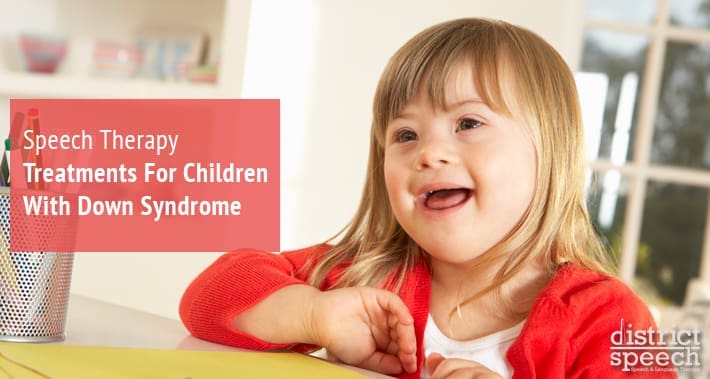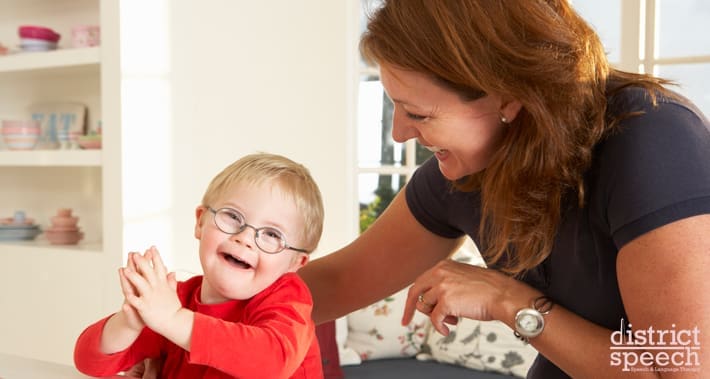
Does your child have Down syndrome?
Raising your child with Down syndrome can be challenging, as it can come with speech disorders, and other physical, and linguistic challenges.
But even if it’s difficult, it’s far from impossible.
There are many resources, and supports that can help you as their parent, and lead your child to a happy and fulfilling life.
We as speech therapists recommend early intervention for the best success towards your child living a fulfilling life.
If your child has Down syndrome, and you’re concerned that their condition may be affecting their speech, speech therapy treatments for children with Down syndrome can help.
Read on to find out more about Down syndrome, what causes it, and how to support your child in their speech development if they have Down syndrome.
RELATED: Frequently Asked Questions About Down Syndrome
What Is Down Syndrome?
Down syndrome, also known as trisomy 21, is a genetic condition that causes developmental delays, and other disabilities in children.
Down syndrome occurs when your child is born with an extra copy of their twenty first chromosome due to abnormal cell division.
The extra genetic material is what can affect your child’s speech, and cause issues with gross motor skills, and other developmental, and physical aspects of your child.
It is a lifelong condition, but many people with it live full and satisfying lives.
The average life expectancy for Down syndrome is around 60 years of age.
Every person with Down syndrome has a different life expectancy, and quality of life based on a variety of factors.
With a better understanding of Down syndrome, you can help your child improve their speech, and support them with the challenges that the condition brings.
There are three different types of Down syndrome.
The types of Down syndrome differ in the number of cells in the body that have an extra chromosome on them, and the number of symptoms typically present.
Mosaicism
This occurs when there is an error early in development during cell division.
Two or more, but not all, cells of the body have an extra chromosome.
People with this particular subtype of Down syndrome tend to have fewer symptoms than those with other types, such as trisomy 21.
Translocation
With the translocation subtype of Down syndrome, children have a total of 46 total chromosomes, but an extra piece of chromosome 21 is attached.
This subtype does not include people with the full chromosome 21.
Trisomy 21
Trisomy 21 is the most common form of Down syndrome.
It occurs when there’s an extra copy of chromosome 21 in every cell.
This type usually causes the most symptoms of Down syndrome, as opposed to the other types.
Symptoms Of Down Syndrome
There are many signs of Down syndrome that include developmental, physical, and medical symptoms.
Neurodevelopmental conditions like autism spectrum disorder are common in those with Down syndrome.
It’s estimated that 16-18% of people with Down syndrome are also autistic.
Mental and social development delays may mean your child with Down syndrome can have a short attention span, poor judgment, and may exhibit impulsive behavior.
They may also take longer to learn new concepts than their peers without Down syndrome.
As a result, your child with Down syndrome is at a higher risk for learning disabilities.
So it’s important to look out for the warning signs of learning disabilities.
If you see these warning signs, your child with Down syndrome may benefit from speech therapy for their learning disability.
Down syndrome also comes with physical signs.
The physical signs are most present in their head, face, and neck.
They can include a short neck, flat facial features, small head and ears, bulging tongue, and eyes that slant upward.
Your child with Down syndrome might also have atypically shaped ears, and poor muscle tone.
An infant with Down syndrome can be born an average size, but will develop more slowly than a child without the condition.
As a result, children with Down syndrome often need pediatric physical therapy interventions as well.
Various medical conditions often accompany Down syndrome as well.
These may include: congenital heart defects, leukemia, late tooth growth, cleft lip and cleft palate, and hip dislocation.
If you have Down syndrome, you may also have a weaker immune system.
You may struggle with respiratory infections, urinary tract infections, and skin infections.
How Can Down Syndrome Affect Language Development?
Down syndrome can affect speech intelligibility or, how easy it is to understand what your child says.
Your child may struggle with the strength, timing and coordination of muscle movements for speech.
There are many muscles and systems involved in speech and Down syndrome may affect your child’s ability to coordinate breathing, voice, and the production of speech sounds.
Down syndrome can also cause:
- articulation problems with certain speech sounds
- low oral-facial muscle tone
- Difficulty with sensory processing
- Difficulty with oral tactile feedback
- Leaving the end off of words while speaking

How Can You Encourage Your Child’s Language Development?
As your child’s primary caregiver, your child interacts with you more than anybody else.
As a result, you can play the biggest role in your child’s speech and language development.
You have the unique opportunity to teach your child communication skills when you’re at home with them.
If you’re stuck for ideas on how to support your child with their language development, check below for things you can do.
Teaching them sign language is a great way to provide support with this.
It is also a way to teach your child about accessibility, and different means of communication that we all have.
Sign language is just one example of augmentative and alternative communication used to aid in the treatment of communication skills for those with Down syndrome.
1. Read To Them
Reading to your child helps your child learn new concepts.
It’s an important step in helping them learn to read as well.
It can also help to show them the text you’re reading, which helps them associate the written word with the sound.
There are many benefits of reading to your child whether they have Down syndrome or not, so crack open a book and get busy.
2. Speak To Them
It may seem obvious, but talking to your child is one of the best ways to help them improve their language development.
The act of talking to your child sets an example for them that they can copy.
It’s also a great way to help your child build their vocabulary, as they get to better understand the context of words and when to use them.
3. Repetition Is Key
Repetition helps a child with Down syndrome to learn a word.
Repeating the word is useful for your child when they need to remember what a word means, and what it sounds like.
You can use fun and games to help your child learn and retain their skills.
4. Use Real Objects And Situations
When teaching a concept, you should use daily activities and real situations as much as possible.
This can include teaching your child the names of the foods you’re having for dinner.
It can also include the names of things your child can see while you’re playing in the park together.
Having the situation and examples helps the child to link the word with a real life object or situation.
Here are some ways you can incorporate these speech exercises using real objects into your home.
5. Follow Their Lead
Look out for signs that your child is interested in a particular object, person or event.
When your child shows an interest in that object or person or event, be sure to give them the name of the concept.
Exploring their interest further will present all sorts of opportunities for you to help them develop their speech.
For instance, if Mr. Potato Head is a game they like, you may use this to teach them language, and articulation.
How Can A Speech Therapist Help?
Here at District Speech in Washington DC, we can help support you in improving your child’s language development at home.
As a caregiver, you want your child to be able to communicate with the people around them.
A qualified speech therapist who has experience working with children with Down syndrome can help build those skills.
This includes building social communication skills.
Speech therapists are familiar with the particular challenges that Down syndrome can cause.
Speech therapists can help your child with Down syndrome to:
- Work around their hearing issues, if they have them
- Be able to feed themselves
- Improve oral motor skills
- Build their vocabulary using language apps
- Improve reading and writing skills
Your child’s speech therapist can also help put together a plan that meets your child’s needs, and suggest exercises for you to practice with them at home.
Your child may struggle with following directions during the tasks in speech therapy.
If this is the case for them, using techniques to help them follow directions may help.
As with many speech therapy treatments, early intervention is important.
You as a caregiver can help with early intervention by teaching language games in your house.
If your child has Down syndrome, speech therapy can help.
Book Your Appointment With District Speech Today
If you’d like to know more about Down syndrome and ways to improve your child’s language skills, District Speech is here to help.
Our trained speech therapists will take the time to get to know your child and assess their needs.
They will then work with you to put together a personalized treatment plan.
Book your appointment with District Speech today.
1300 I St NW, Suite 400 E,
Washington, DC 20005
- https://g.page/districtspeech
District Speech and Language Therapy specializes in speech therapy, physical therapy, and occupational therapy solutions, for both children and adults, in the Washington D.C and the Arlington Virginia areas.